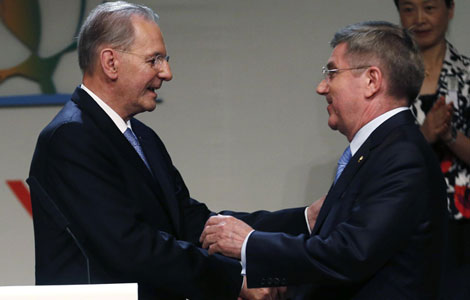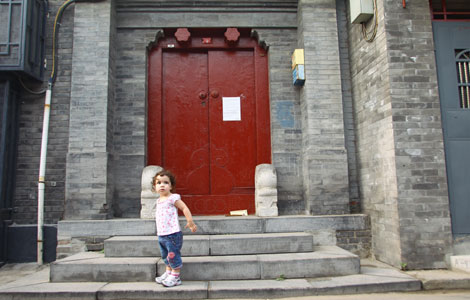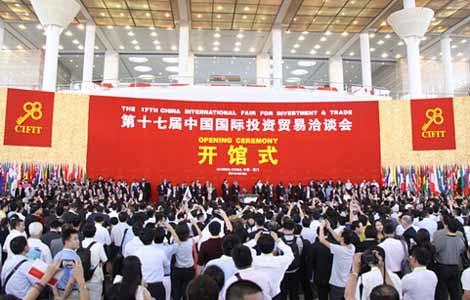Li plots course ahead
Updated: 2013-09-11 08:31
By DING QINGFEN in Dalian, CHEN JIA in Beijing, CHEN WEIHUA in Washington and CHEN JIA in San Francisco (China Daily)
|
||||||||
Nicholas Borst, a research associate and China program manager at the Peterson Institute for International Economics, a Washington-based think tank, said Li's plan showed that the new leadership acknowledges that some of the slowdown in growth was due to these restructuring initiatives.
"It signaled very clearly that the new leadership understands that the growth model must change and that this will be a long process," said Borst.
The premier also pointed out that the world's No 2 economy "can no longer afford to continue with the old model of high consumption and high investment… Instead, we must take a holistic approach in pursuing steady growth, structural readjustment and further reform," Li wrote.
"The premier has offered a welcome reinforcement of plans for reform and rebalancing of the economy as the Third Plenum approaches," said Douglas Paal, vice president for studies at the Carnegie Endowment for International Peace, another Washington-based think tank.
"These policies produce both winners and losers, so outside observers will watch closely for how these policies are implemented," noted Paal. "They will also be seeking greater transparency about China's accumulating debt structure."
"[Li's] plan to make the economy more balanced with an emphasis on raising the standard of living for the rural sector means generally more personal consumption and therefore more opportunity for everybody to sell more to China," said George Koo, a Chinese community leader and international business consultant in San Francisco Bay Area.
The country's economic growth slowed to 7.5 percent in the second quarter, down from 7.7 percent in the first — the ninth deceleration in the past 10 quarters.
Investors had feared the economy was slipping into a deeper-than-expected downturn, especially after the money market suffered an unprecedented cash crunch in June.
But the central government has introduced measures to stabilize the economy, including small-scale investment in railways and public housing construction and the launch of policies to help small companies in need of financing.
"It is imperative for China to continue with these reform policies to ensure greater economic and social stability," said Stanley Kwong, a professor in the China Business Program at the School of Management at University of San Francisco.
"These measures would strengthen China's integration into the global economy with major implications both for China and for the world," Kwong added.
The country's policymakers have repeatedly said China is capable of reaching this year's economic growth target.
Li also said on Tuesday that the government is studying the launch of a deposit insurance system, further opening up the financial market and encouraging more Chinese enterprises to expand business overseas.
Economists said the recent positive economic figures will leave room for China to push forward the reform initiatives and restructure the economy away from dependence on credit, investment and exports and more towards growth driven by consumption.
Zhu Haibin, chief Chinese economist at JPMorgan, said the ongoing economic reform and restructuring, which are the top priority for the new leadership, will benefit China's growth in the long term, even though they may slow it in the short term.
"In particular, overcapacity and low investment efficiency in a number of sectors, as well as credit imbalances and rising leverages accumulated in the past four to five years, remain the major challenges to be addressed by the new leadership in the coming years," Zhu said.
Li is scheduled to give a keynote address at the Dalian forum on Wednesday on China's economic growth and policy.
Contact the writers at dingqingfen@chinadaily.com.cn and chenjia1@chinadaily.com.cn

 China's Christian churches reduce leaders' age ceiling
China's Christian churches reduce leaders' age ceiling
 Student's rare blood bonds Kazakhstan and China
Student's rare blood bonds Kazakhstan and China
 Apple's low-end phone price disappointing
Apple's low-end phone price disappointing
 US marks 9/11 anniversary
US marks 9/11 anniversary
 German Bach elected as IOC president
German Bach elected as IOC president
 Implant surgery for boy's eyes a success
Implant surgery for boy's eyes a success
 Hutong life facing change
Hutong life facing change
 New York Fashion Week in session
New York Fashion Week in session
Most Viewed
Editor's Picks

|

|

|

|

|

|
Today's Top News
Report questions US firms pursuing cloud computing in China
Reducing poverty gains momentum in Asia
China turns to US sorghum for animal feed
Russia proposal likely to avert US airstrikes
Li stresses transformation of economy
FM dismisses Philippine accusations
China's global firms face 'trust gap'
Shanghai gets tips on innovation
US Weekly

|

|






